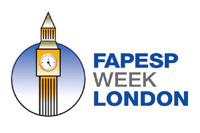News
FAPESP Week London highlights scientific cooperation between Brazil and Europe Versão em português
 Symposium in September at the Royal Society brings together researchers to debate advanced scientific topics
Symposium in September at the Royal Society brings together researchers to debate advanced scientific topics
Some of the most recent advances in science and the development of new technology obtained by researchers in Brazil and Europe over the last few years will be the topics of debates during FAPESP Week London, to be held from September 25 to 27 at The Royal Society, London.
Sponsored and coordinated by the São Paulo Research Foundation (FAPESP), the British Council and The Royal Society, the symposium will help to broad the already significant existing bilateral partnerships in science among Brazil and European countries.
During FAPESP Week London, researchers from diverse higher education and research institutions will discuss the results of their work; among them are: Carlos Alfredo Joly, University of Campinas & BIOTA Project, FAPESP, Paulo Eduardo Artaxo Netto, Lisete Compagno Michelini, Maria Immacolata Vassalo de Lopes and Siu Mui Tsai, from the University of São Paulo, Luciana Vanni Gatti, IPEN, and E.A. Thoroh de Souza, University Mackenzie.
The Brazilian scientists will debate with renowned researchers from European institutions, including: Martyn Poliakoff, Foreign Secretary and Vice-President, Royal Society, Peter Olesen, Chairman on the Danish Council for Strategic Research, Georgina Mace, Imperial College London, Gordon McFiggans, University of Manchester, Jeremy Woods, Imperial College London, and Philip Macnaghten, Durham University.
Among the topics that will be debated many are on the frontiers of sciences, such as Biodiversity, Climate Change, Genomics, Biofuels and Nanotechnology. FAPESP Week London will also have panel discussions about International Scientific Collaboration, Challenges and Opportunities in University-Industry Collaborative Research, and Science Culture.
FAPESP Week London is happening at a moment in which Brazilian research has reached its highest international projection, with indices that denote its greater participation in the global science and technology system.
“The work at FAPESP to prioritize the intensification of international relations for researchers and higher education and research institutions in the State of São Paulo generates and broadens knowledge in all areas in which it occurs. In the contemporary world, science is an activity that depends more and more on the international cooperation efforts, particularly because many of the most important phenomena facing science do not occur only nationally”, says Celso Lafer, President of FAPESP.
The registration at FAPESP Week London is free of charge.
More information about the symposium is available at: www.fapesp.br/week2013/london.
Page updated on 09/13/2013 - Published on 08/01/2013
